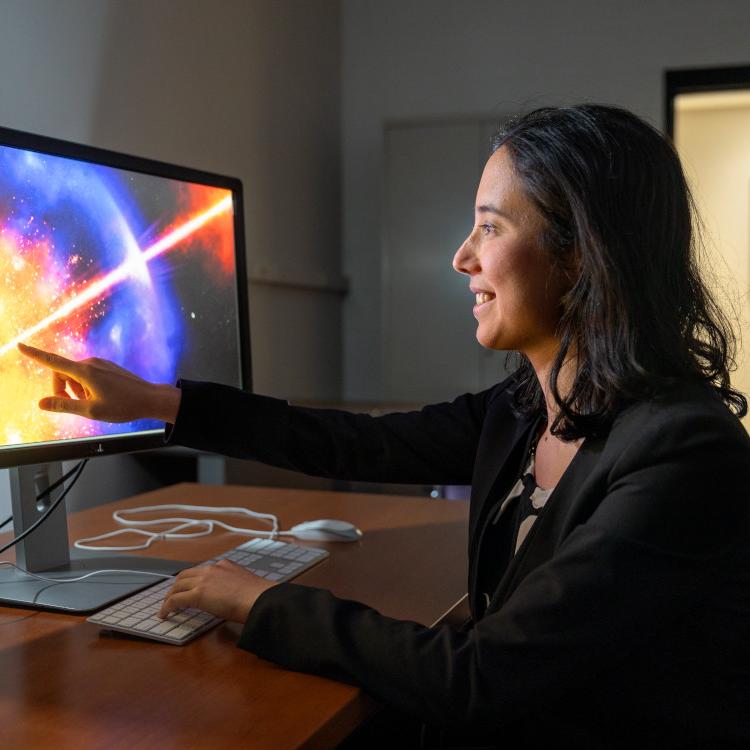There’s a gap between technology and policy, according to Sarah Kreps.
To research the growing connections and potential disruptions at the intersection of technology and government – many of them related to artificial intelligence (AI) – Kreps, the John L. Wetherill Professor of Government, launched the Tech Policy Lab in 2020.
Engaging undergraduate researchers, graduate students and a postdoctoral fellow, the Tech Policy Lab examines how politics shapes the deployment of new technology that affects the lives of millions. Lab members also study ways technology can potentially interfere with domestic and international politics.
The research areas are broad and interdisciplinary, Kreps said, bringing together faculty and student researchers with backgrounds in computer science, epidemiology, information science and social sciences to study issues including COVID-19 vaccine preferences, misinformation in the political and medical space, and the potential uses and misuses of AI in political communication.
“Tech labs at other universities [Kreps has identified four worldwide] start from the perspective of the technology and deal with politics as an afterthought,” said Kreps, who has worked in tech policy for two decades. “We’re starting this from observations about the ways that politics have been disrupted by technology – and also taking the technology part seriously.”
The Tech Policy Lab is unique not only for its focus on political institutions, but also for its emphasis on undergraduate involvement, Kreps said. Undergraduate researchers, most of them through a collaboration with the Milstein Program in Technology and Humanity, are at the heart of the lab’s research and public engagement.
In fall 2020, undergraduate researchers worked on two inaugural projects, said Julie George, a doctoral student who studies emerging technologies and mentors the lab’s undergraduate researchers.
Members of one group studied Twitter and the China-based platform Weibo. They compared levels of misinformation about the COVID-19 pandemic on the two platforms by scraping data from January and February 2020 and using machine learning to analyze it.
Members of another group used GPT-3, a language prediction model that generates human-like text using deep learning, to assess and counter social media content concerning COVID-19 vaccines.
“The work we’ve done over the past couple months has been fascinating and thought-provoking and, I think, really relevant to the time we’re living in, especially the pandemic,” George said.
“Much of our attention is on politics and political representation and how political leaders and constituents interact with each other, a lot of it through social media,” Kreps said. By studying social media, researchers learn how AI natural language models such as GPT-3 can be used to both interfere with and enable government processes, she said.
In research published in 2020 in the Journal of Experimental Political Science and summarized in a Brookings Institution TechStream post, Kreps showed how natural language AI model GPT-2 allows political actors to synthetically generate text in ways that mimics the style and substance of human-created news stories. They found that people are mostly incapable of distinguishing between text generated by humans and that generated by AI.
These findings have implications in understanding AI in online misinformation campaigns, Kreps said, because the technology potentially allows malicious actors to generate inauthentic content at scale.
During the spring 2021 semester, teams of Tech Policy Lab undergraduates are creating two specific applications that incorporate insights from the lab’s previous research, Kreps said: a phone app aimed at the general public, and a tool for elected leaders.
“We’ve grown to a point where we have two different divisions: the research side and the industry side,” Kreps said. “That’s exciting because we are taking ideas from the research and bringing them into something that’s concrete and tangible.”
The lab’s work has already had an impact on policy decisions: AI policy research on contact tracing apps and COVID-19 surveillance by Baobao Zhang, Klarman Postdoctoral Fellow and member of the Tech Policy Lab, was used by a U.S. Senate report in July 2020.
Kreps said she expects real-world solutions to develop out of undergraduate innovation coming from this lab. The current projects are just the beginning of what the lab can do, she said, and efforts are underway to scale up.




